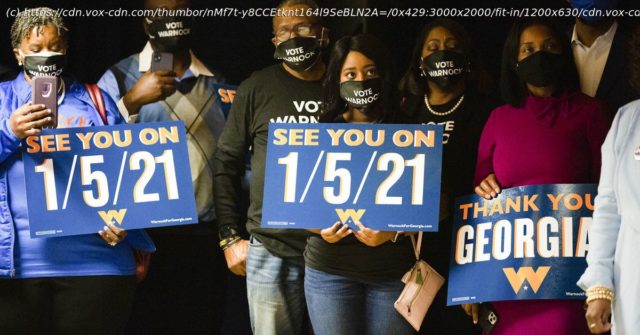Racist lawmakers built Georgia’s election system, and now it’s affecting the balance of the Senate.
America still doesn’t know which party will control the next US Senate — all due to Georgia’s peculiar election system rooted in the Jim Crow era. How that system works: In Georgia, no candidate can advance through a primary or a general election system without first earning more than 50 percent of the votes. If no one does, the top two vote getters advance to a runoff election, ensuring that one will earn the majority of votes cast. This election cycle, the state’s two Senate races — one regular, the other a special election to fill the remainder of a retired senator’s seat — have gone to January 5 runoffs. The regular election race is between Sen. David Perdue and Democrat Jon Ossoff; the other is between Republican Sen. Kelly Loeffler and Democratic Rev. Raphael Warnock. Georgia voters who are heading to the polls Tuesday — and the more than 3 million voters who have already voted early — won’t just be choosing their two representatives in the upper chamber. They’ll also, as Vox’s Ella Nilsen explained, be determining “whether Democrats can take control of the Senate — and, therefore, political power in Washington.” At first glance, Georgia’s law requiring majorities for an outright victory seems inoffensive — the person who wins has to be chosen by most of the people who cast their votes. In theory, this would force candidates to appeal to more voters instead of winning with a large plurality of votes while holding views anathema to the majority of the electorate. But Georgia’s runoff system has a darker origin: Many historians say it was designed to make it harder for the preferred candidates of Black voters to win, and to suppress Black political power. The history of Georgia’s runoff system The origin of Georgia’s runoff system is a little complicated. It effectively began in 1962, when the Supreme Court struck down Georgia’s old electoral system. That older system, called a “county-unit system,” was created 45 years prior to amplify rural voters’ power while disadvantaging Black voters’, and was “kind of a poor man’s Electoral College,” University of Georgia political science professor Charles Bullock told Vox. Forced to come up with a new system, Georgia created one intended to continue undermining Black voters’ influence. That was the runoff system, whose origins were detailed in a 2007 Interior Department report: Essentially, Groover wanted to stop Black Georgians from voting as a “bloc” — that is, overwhelmingly for one candidate or party — while white Georgians split their votes among many candidates. In a plurality system, if Black voters were able to keep a coalition behind one candidate, they wouldn’t need the support of many white voters for their preferred candidate to win elections. The method was popular across the former Confederacy: Alabama, Arkansas, Georgia, Mississippi, Oklahoma, South Carolina, and Texas all have general election runoffs.






